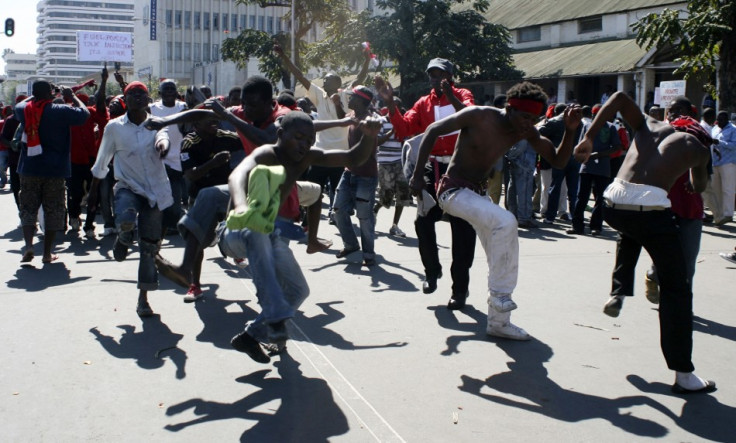Malawi: Are Fuel Shortages or Government Repression responsible for the Protests?

The U.S. condemned the use of force by Malawi's police to break up anti-government protests in the past two days, and warned the government against a crackdown on the free press.
In Malawi, 18 people were killed when security forces confronted protesters in the towns of Blantyre, Lilongwe and Mzuzu, Henry Chimbali, the spokesman for the health ministry, said by phone today. At least 44 people are being treated for gunshot wounds in Mzuzu, Amnesty International, which said an investigation assessing the police response should be launched, said .
As the deaths of the demonstrators were announced, the Malawi Communications Regulatory Authority switched off three private radio stations -- MIJ FM Radio, Joy FM Radio and Capital Radio -- to stop them from reporting on the protests, according to the Media Institute of Southern Africa, Malawi Chapter.
Amnesty said in an e-mailed report that it had recorded "increasing intolerance of dissent, and vilification of human rights activists by senior members of the government" in recent months.
President Bingu wa Mutharika said yesterday that he is willing to hold talks with civil-society groups and opposition parties to end the protests, however he refused to respond to a list of demands from the protesters. Mutharika also made it clear his forces will act against the leaders of the protests if there is looting.
However, despite the president's denial, it is clear the government forces are responsible for the deaths of the protesters.
Meanwhile, in order to prevent the country from spiralling further into an economic crisis, the government should rethink its policy to devalue the local currency, economists say.
Over the past two years, Malawi has experienced sporadic fuel shortages, which become even more severe since January, forcing motorists to queue for hours, sometimes even waiting throughout the night at petrol stations.
According to commentators, the failure of the government to contain the forex scarcity to purchase fuel is mainly to blame, while on the other hand, on Wednesday, the President blamed the fuel problem and forex shortage partly on International Monetary Fund (IMF) policies.
Mutharika also denied that the forex shortage was because of government's fixing the exchange rate.
"At the insistence of the IMF, government is not managing forex. That is in the hands of the private sector and they stow it away in foreign banks," he said.
The president also recently announced that all forex will be managed by the Reserve Bank, adding that all commercial banks in Malawi will be required to submit monthly reports on how much forex they handle to government.
IMF and local economic experts have also repeatedly called on government to devalue the Malawi currency, the kwacha to generate forex, which the government has until now refused to do.
"I cannot devalue the kwacha because no one, including the IMF, is giving me convincing arguments on what will be done to deal with the rise of the cost of living that will follow the devaluation," Mutharika said.
But Richard Chiputula, an analyst at the economic policy think-tank Malawi Economic Justice Network differed with government.
"That devaluation can cause inflation is true, but I would favour the inflation that comes about because of devaluation because there will be production. In the current scenario, inflation will be because of lack of commodities because we don't have forex to produce which, in my view, is dangerous," he said.
The Malawi president said that the IMF policies pushed the government to hand over the importation and distribution of fuel to the private sector, where companies are more interested in maximising profits than ensuring a consistent supply of fuel.
However he also insists the government is in the process of establishing a national oil company that will take charge of purchasing fuel and has contracted an international firm to construct storage facilities that are expected to be ready within the next six months.
Mutharika blamed the fuel shortage on "tremendous economic developments" that Malawi is experiencing in construction, manufacturing and agriculture, which lead to high fuel consumption.
The President is however increasingly under international scrutiny as the crackdown of protesters is just another illustration of its repressive methods.
"The government's attempt to prohibit its citizens from marching, and the Communications Regulatory Authority's ban on independent media coverage undermine democracy and the rule of law that Malawians cherish," U.S. Department of State spokeswoman Heide Bronke Fulton said in an a-mailed statement.
The U.S. is among foreign donors that provide as much as 40 per cent of Malawi's annual national budget. The U.K. also expressed its concern "about the state of democratic governance and human rights in Malawi," according to an e-mailed statement by the minister for Africa, Henry Bellingham, yesterday. "The situation is extremely worrying," he said.
However, Britain announced last week that it has suspended 35 million dollars worth of budget support to Malawi, raising fears of hardship for ordinary Malawians. Relations between the two nations have soured after Malawi expelled a British envoy who allegedly accused Mutharika of becoming increasingly autocratic and failing on governance.
Political analyst at Mzuzu University, Noel Mbowela, said the protests have shown that Malawians appreciate that it is possible to turn things around even against a "repressive government". He said this protest was a clear message to government to address the concerns raised.
Similar protests were last held in 1992 and unseated the late president Hastings Kamuzu Banda.
© Copyright IBTimes 2025. All rights reserved.




















